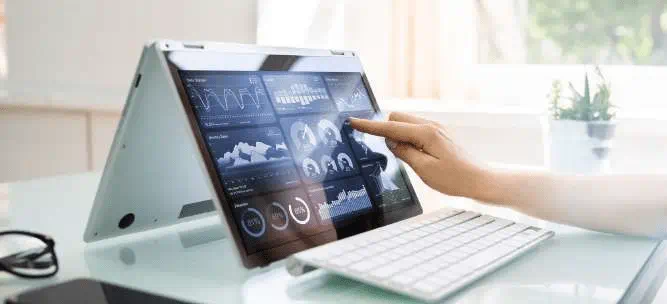
Technology for a Greener tomorrow
10 मार्च 2021

Dear Reader,
Climate change is real and it is happening. Observable effects are seen everywhere- glaciers have shrunk, ice on rivers and lakes is breaking up earlier, plant and animal ranges have shifted and trees are flowering sooner. A 2°C increase could mean more heat waves, a ten-fold increase in Arctic ice-free summers and a complete wipe-out of the world's coral reefs, home to millions of species. More frequent and intense drought, storms, heat waves, rising sea levels, melting glaciers and warming oceans can directly harm animals, destroy the places they live, and wreak havoc on communities and people's livelihoods.
As per NASA, the planet's average surface temperature has risen by about 0.9oC since the late 19th century, a change driven largely by increased carbon dioxide and other human-made emissions into the atmosphere. Companies realize the gravity of the situation and know that the time to act is now. Aiding them in this quest is Artificial Intelligence (AI) and other modern technologies like Machine learning.
Google’s UK-based DeepMind laboratory applies its industry-leading knowledge of neural networks and machine learning to apply more efficient data interpretation to energy consumption and energy-grid distributions. These learnings were deployed for efficient energy distributions in wind farms. Prediction models developed there were used in scheduling energy deliveries resulting in a 20% improvement in operational efficiency.
Climate change has led to teething problems for the global poor and poverty stricken populations leading to poor living environments and onset of diseases and other related ills. AP-Latam, a project run by Argentina-based Dymaxion Labs, uses AI to analyze high-resolution satellite imagery to detect areas of informal settlement growth in precarious areas that are logistically difficult to analyze on the ground. By understanding and predicting areas of potential slum growth and population movements, governments can make better decisions on how to help affected families mitigate the effects of climate change.
Transportation accounts for 23% of global greenhouse-gas emissions, leaving plenty of room for positive contributions from AI. DHL and IBM have teamed up to use artificial intelligence to improve DHL’s global logistics operations. By predicting demand, risk, supply-side variations and other variables, DHL is curbing emission by optimizing their process.
Earth is the only planet we have to call home and global warming is causing irreversible damage. Global awareness is creating waves of innovation and optimizations to reduce the global warming footprint of corporations and individuals.
Credits : Akhil Handa,Prithwijit Ghosh
Popular Articles
Related Articles










-
Disclaimer
The contents of this article/infographic/picture/video are meant solely for information purposes and do not necessarily reflect the views of Bank of Baroda. The contents are generic in nature and for informational purposes only. It is not a substitute for specific advice in your own circumstances. Bank of Baroda and/ or its Affiliates and its subsidiaries make no representation as to the accuracy; completeness or reliability of any information contained herein or otherwise provided and hereby disclaim any liability with regard to the same. The information is subject to updation, completion, revision, verification and amendment and the same may change materially. The information is not intended for distribution or use by any person in any jurisdiction where such distribution or use would be contrary to law or regulation or would subject Bank of Baroda or its affiliates to any licensing or registration requirements. Bank of Baroda shall not be responsible for any direct/indirect loss or liability incurred by the reader for taking any financial decisions based on the contents and information mentioned. Please consult your financial advisor before making any financial decision.
Tech-enabled Hostels
In the current era of technological advancements where there is an app for almost everything, hostel management appears to lag behind in adopting a new innovation. From redundant paperwork to time-consuming manual processes, most of the hostels are still following archaic methods to manage their day to day activities. These old school methods of functioning results in ineffective communication between hostels, its students and parents.
Some of the hostels or student housing companies are investing in new-age technologies to differentiate themselves by being markedly different from traditional university-led hostel systems. Such technologies include facial recognition security systems, RFID enabled libraries and canteens, attendance systems that both students and parents can access on their smartphones.
Even though student housing as a market is currently dominated by university-led facilities, it will potentially see a substantial growth with private companies entering the space to plug demand gaps. Real estate consultancy firm JLL estimates the space is expected to see a 38% CAGR amounting to Rs 2,400 crore by 2020.
Most companies in the space, like OxfordCaps, Stanza Living and Placio have standardised their attendance systems with a professional escalation matrix. They also offer biometric security systems where entry and exit times are recorded. Hostels can set a threshold time, based on which if the student is not in within a certain time, parents get a notification. OxfordCaps is leveraging IoT-connected devices to monitor energy and space consumption, specifically in gyms, reading lounges and TV rooms, where usage usually remains untracked.
Considering industry average of around 40% for food wastage in hostels in urban centres, various organisations like Stanza Living are using advance analytics to reduce operational costs. With the ability to predict and analyse consumption data, food wastage at Stanza properties have been reduced to less than 10%.
On the other hand, Placio brings social incentive that is used by ride hailing firms such as Uber and Ola to hostels. It digitally tracks various parameters like student behaviour, general cleanliness, punctuality etc. to reward the better ranked students with online gift vouchers.
With majority of the students staying at hostels to complete their education, such tech-based offerings not only improve the quality of life but also help them get exposed to advanced technologies like facial recognition, digital gift vouchers etc.
The pandemic & cybersecurity
There is no doubt that the COVID-19 pandemic has caused an outbreak of new and unanticipated business moments. As digital spreads its roots deeper, it also increases the risk and impact of cyberattacks. The World Economic Forum’s COVID-19 Risks Outlook reported that 50% of enterprises were concerned about increased cyberattacks due to a shift in work patterns alone.
A TCS report states that, cybercriminals are using the heightened digital footprint and traffic to track vulnerabilities, or to siphon off money. They are launching Covid-19-themed attacks in the form of phishing emails with malicious attachments that drop malware to disrupt systems or steal data and credentials.
Attackers are creating temporary websites or taking over vulnerable ones to host malicious code. They lure people to these sites and then drop malicious code on their digital devices. Fake websites have also been soliciting donations for daily wage earners through email links. Some Covid-19 patient count-status apps and links are laden with viruses and identity theft malware. Remote working tools such as videoconferencing systems have been hacked for vulnerabilities; recent examples on Zoom are alarming.
In such a scenario, the first step in the right direction for Organisations would be to advise their staff and customers to be more vigilant and cautious especially when opening links, emails or documents related to the subject COVID-19.
Next, organizations should ensure their detection and ing capabilities are functional while keeping an eye on the impact of having many remote workers. There are some interesting solutions available in the market. For eg. KnowBe4 delivers on-demand internet security awareness training to small and midsized enterprises focussing on threats like social engineering, spear-phishing and ransomware.
Cofense provides organizations with the ability to improve their employees’ resilience towards spear phishing, malware and drive-by attacks and further facilitate employee-sourced detection of such attacks.
In India, cybersecurity start-ups like Cloudsek offers real-time information to prevent and monitor cyber threats through its SaaS platform. Another start-up Cyware’s cyber fusion solutions empowers organisations to foster information sharing with their employees mitigating cybersecurity risks.
The pandemic presents an opportunity for full-blown innovation, a dramatic shift in perspective and the adoption of safe and resilient operating processes. The intensity and emphasis an organisation brings to its cybersecurity strategy will determine its long term growth.
Credits : Akhil Handa


Leave a Comment
Thanks for submitting your details.